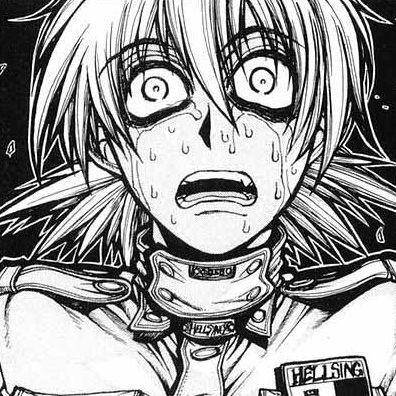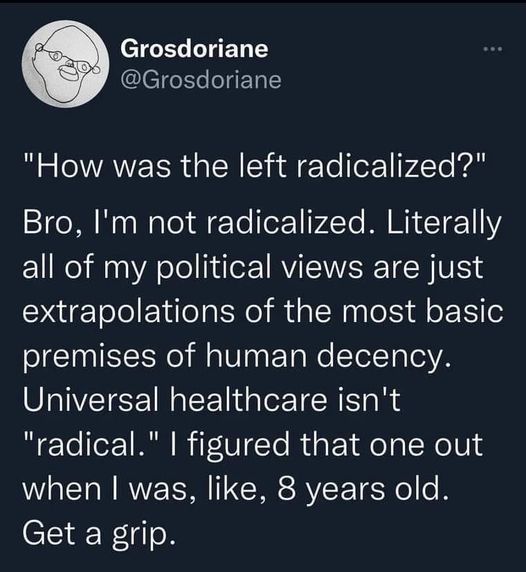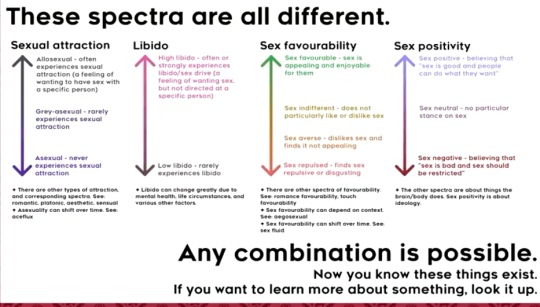#post-left
Explore tagged Tumblr posts
Text
(I accept debates without any problems, I ask for education and respect <3).
Need to talk this here because no way i am the only person who think like this, but:
I HATE fans of the 2001 anime when they decide to talk about Seras. For me it's a kind of redflag when I see these guys want to say that the first Seras is better than the Ultimate one because she's more "serious, nihilistic (? wtf are u talking), intelligent" and reduce the 2006 one as a "whiny girl with big breasts who is disposable". I feel disgust, hate and want to murder anyone who says that, I've already written about Redpills co-opting Alucard as a "symbol of macho-man" (even though his character goes against EVERYTHING of that), these people are usally 5 options:
-Only consumed the 2001 and nothing else
-Only saw edits/scenes on the internet, thought it was cool to put Alucard's icon and made a larp about being a Hellsing fan
-Watched the 2 animes and read the manga, but only to do mediocre power scaling because when you actually ask about the story THEY DON'T KNOW HOW TO ANSWER ANYTHING, NOT EVEN THE BASICS OF THE BASICS OF HELLSING THAT YOU HAVE TO KNOW...
-Only watched the Abridged because it's based on the argument of "it's funnier and better than the original!!!" (lmao yes, a parody that has a humor that is the juice of 2010 and that only a few scenes save it - and even with those that are saved, they became EXTREMELY saturated by fans to the point that it's annoying when you go into a cosplayer's comment or Hellsing fanart and only have Abridged jokes)
-Or just an avowed Nazi (but that doesn't mean he's separate from the other options above, because I've seen a lot of these guys in what I mentioned in the 4 topics who have far-right attitudes in their veins)
and realize that it's usually straight men lmao.
But back to Seras, I cried watching Ultimate again after years and she is one of my favorite characters. I love both versions of her character (Gonzo's or Madhouse's), but the 2006 one has my heart because I identified with her a lot at certain moments. Seras was someone who only suffered in her life but continued to be strong and the sweetheart that she is. People think that someone who is not "serious, without emotions and feelings" is not someone strong and worthy of respect. Guys, the 2006 Seras adapts the Seras from the manga. In Ultimate and in the manga she constantly questions about the afterlife (becoming a vampire, since she is dead) and at first she couldn't dissociate herself from the "human" because it was something so sudden, she got a fucking shot in the chest at a time when she was almost going to be r**ed and killed, she was taken to Hellsing (without knowing anyone) and still has to deal with more deaths in front of her (whether caused by her or not). Do you really think she's mentally stable?
IMO, I think those scenes with Alucard where he tells Seras to forget that she was human are very important, because if you look at it from a post-humanist perspective, it makes a lot of sense, because it brings up the debate about "humanity" not being something good outside of common sense but rather as a colonialist and violent concept, which arises with the rhetoric of civilizing discourse against native peoples (as a Spanish-Brazilian, it's extremely sad to see the effects of colonialism, especially against indigenous peoples) . We notice this even more in the current context when we see how society deals with trans people, disabled people, racialized people, women and any social minority that does not follow the correct standard of "being human", all in defense of a human security system (which is just racism, patriarchy and all the ways to maintain the structures of violence that kill us every day). Alucard is disappointed when Seras doesn't drink the blood precisely because he wants her to be strong and finally independent, that she came out of that suffering as a human and can now have a new life (I don't like this reading of saying that Alucard was "enslaving her").
and that's why I like Seras from 2006, especially in the scene where she feeds on Pip to defeat Zorin, you see a new Seras indeed. You see our cute and charismatic blonde vamp finally accepting being more than human, accepting the change and wanting to protect those she loves in that chaos in London. Seras from the OVA has development, that's why I hate the guys who only like Seras from 2001 saying that she had "no development at all and only exists for the sake of existing".
(a bit of "A Cyborg Manifesto" by Donna Haraway vibes but in the Hellsing context)
It's one thing if you like the anime version of Gonzo better and that's fine, I understand and respect it (i love this version of her too), but saying that Seras from the OVA is a horrible, useless and undeveloped character really upsets me.






#hellsing ultimate#hellsing#seras victoria#seras hellsing#post-humanism#post-left#manga#idk#rant#vampires#i love u Seras#fans of hellsing abridged should have much more sense#I died writing all this
50 notes
·
View notes
Text


50. What happens to ownership in the syndicalist vision?
If all employees are to take over production, if everyone is to run the economy in democratic forms, then who should own the means of production? The answer of syndicalism is: all in common, primarily society as a whole. Why? The reason is simple. It is not only producers who have a legitimate interest in influencing production. The consumers or those who use the goods and services also should have a say. Likewise, other citizens (or members of society) should influence the framework for production.
In addition to companies owned by society, some companies can be owned collectively by those who work in them. This includes producer cooperatives and family companies where only family members work. Such groups own only the means of production with which they work themselves. They do not buy labour power that they exploit and control. The same applies to self-employed individuals who don’t employ others. Syndicalists support a combination of community-owned companies and worker-owned companies.
“In order to restore democracy, one thing and one thing only is essential. The people will rule when they have power, and they will have power in the degree they own and control the land, the banks, the producing and distributing agencies of the nation.” John Dewey (1859–1952), classical liberal and educator
In all societies, wealth is a product of the labour of the population. The enormous wealth that a small capitalist class has now amassed is therefore to be regarded as stolen property. The combination of community-owned companies and worker-owned companies would mean that wealth is returned to its creators, the population. This must of course be done without compensation to the capital owners. You do not reward the thieves after the stolen goods have been returned.
What would it mean, in concrete terms, that society owns the means of production? The goal of syndicalism, as already stated, is not nationalization under a political dictatorship or under the current parliamentary state. To answer this question, one must raise the question what the syndicalist vision would mean for the future of the state.
#unions#classism#anarcho-syndicalism#anti-left#class struggle#class unions#feminism#feminist unionism#internationalism#popular organization#popular power#post-left#SAC#Sweden#union organizing#swedish politics#anarchism#anarchy#anarchist society#practical anarchy#practical anarchism#resistance#autonomy#revolution#communism#anti capitalist#anti capitalism#late stage capitalism#daily posts#libraries
3 notes
·
View notes
Note
I like your "Lumpen Theory: Genealogy of a Panoptilumpenism" posts. Did you write these yourself? If so, I'm impressed.
I did! In fact it's a text that took a while to be finished. It was first published on my Substack, you can check out the original version there.
8 notes
·
View notes
Text

Remember when 12 year olds just got into linkin park and weren't doing shit like this?
6 notes
·
View notes
Text


* Won't you play again, Kris?
#deltarune#deltarune fanart#kris dreemurr#kris deltarune#asriel dreemurr#noelle holiday#dess holiday#first post since the chapters released#i wanted to draw something that could at least partly represent how many feels i was left with#but its kind of impossible#these chaps were so peak#all those kris piano scenes bro#all those Kris Scenes in general#i truly won#deltarune spoilers#crythartic's art
47K notes
·
View notes
Text

Source

Source

#politics#us politics#government#the left#public health#current events#news#doge#Elon musk#twitter post#capitalism#eat the rich
65K notes
·
View notes
Text
kinda why i don't ID as leftist anymore tbh. this feels.. unambitious? I'm definitely more radical than i was a year ago, and a year before that, and so forth. i'll be ashamed if im not any more radical next year. there's always room for more ideas, more growth.

76K notes
·
View notes
Text





pnf revival challenge day 4: driver’s license!
Hosted by @howtonerdoutovereverything!✨
I wanted to add a page where they get pulled over by cops but ironically I spent 10 hours driving myself today and I’m falling asleep at my desk kfbshckm anyway here’s a bonus meme:

#phineas and ferb#pnf#pnfrevivalchallenge#candace flynn#perry the platypus#phineas flynn#ferb fletcher#kad draws#I have 2% battery left watch my ipad die as I click post
29K notes
·
View notes
Text




i come from the universe where everything is the same except disney heroines get like an ounce of their fathers' obviously dominant genes and their clothes are like 80% more historically accurate. it's beautiful here.
[2] [3]
#do you like my awesome screenshot edit/style match skills.#i've been honing this for years#i love how these turned out#alsooo i think aurora is the prettiest princess ever :[ i love her 40s influence smmm <3#her parents r great and alive too... ily king stefan he's very pretty#also it drives me up the wall how fat people are drawn with TOTALLY different proportions than the protags#i do enjoy both looks but i wish they blended better. like at least give them. similarly sized skulls. yknow.#disney#beauty and the beast#sleeping beauty#do you like my totally out of left field random post at 5am on january third?? enjoy#redesign
25K notes
·
View notes
Text
the sweet and humble sudoku: here’s some numbers to get you started :) please enjoy my puzzle <3
the nefarious minesweeper: why don’t you just Guess. fucking Guess.
#posts made from 1998#hate when ive almost cleared the board only for it to be left to a 50/50#orphe yaps#delete later
38K notes
·
View notes
Text

just a handy little info chart on the spectrums of sexuality.
/Edit: I forgot to give credit this is a screenshot from a video made by a content creator called Lily Orchard you should check her channel out it's amazing
#culture#the left#leftism#progressive#lgbtqi#lgbtqia#lgbtq community#lgbtq#lgbt pride#queer#queer pride#queer community#information post#informative#useful information#info#helpful#psa#trans#transgender#asexual#sex positive#libido#infographic#queer inclusion#queer inclusivity#Gay#mlm#wlw#lily orchard
28K notes
·
View notes
Text


10. What is “sabotage” in a trade union sense?
The early labour movement (starting in the 19th century) often spoke of “sabotage” in a trade union sense. If the term direct action can be misunderstood, the word “sabotage” causes even worse misunderstandings. According to modern Swedish criminal law, sabotage is an act that endangers the health or safety of several persons. The early labour movement used the word in an essentially different way. The trade unionist “sabotage” was a general label for various alternatives and complements to strikes.
Some examples of such alternatives are slowdowns (i.e. to slow down the pace of work), so called work-to-rule (exceptional obedience to regulations at work, again to slow down the pace) or to inform consumers as whistle-blowers if for example the company’s products are of bad quality.
Another example of “sabotage” in the unionist sense is the method good service. This means that employees provide consumers with such a good service that the rest of the work is delayed. Another example is to take the tools out on solidarity strike. This method is a protection against strike breaking. This could mean, for example, that striking transport workers leave their vehicles standing and take the keys with them. In today’s digitalized society, this method can mean making it impossible for strike breakers to log in to office computers or to access factory robots.
The purpose of unionist “sabotage” is usually to defend the health and safety of workers, consumers or other members of society. However, the very word “sabotage” is far too vague and completely outdated. The alternative is to use more descriptive terms such as slowdowns, work-to-rule, take the tools out on solidarity strike, etc.
It sometimes happens that employers dig up old union writings about “sabotage” in order to tarnish the union’s reputation. Bosses then accuse the representatives of advocating “sabotage” and play on the term’s connotations to assassinations and even terrorism. The bosses recite words out of context and in bad faith. The union solution is again to be clear in the communication. Always let slander blow back on the slanderer.
At many workplaces, employees are not ready to exercise collective pressure for the simple reason that there is not a strong enough sense of community. The first step for syndicalists is then to build that community.
#trade unions#unions#classism#anarcho-syndicalism#anti-left#class struggle#class unions#feminism#feminist unionism#internationalism#popular organization#popular power#post-left#SAC#Sweden#union organizing#swedish politics#anarchism#anarchy#anarchist society#practical anarchy#practical anarchism#resistance#autonomy#revolution#communism#anti capitalist#anti capitalism#late stage capitalism#daily posts
6 notes
·
View notes
Text
Tiqqun cursed me to Intellectual Depression...
By : Santiago "Weebu" Pemo

As a French reader, I am much more impacted and attached to French philosophy and its theorists than most people. I feel a deep connection to the language I grew up with and these theories that so deeply resonate with my being, some ideas and vague concepts I have had since the dawn of my political consciousness, that also appear to be fundamental for these intellectuals, way before my time. There is something truly eye opening about finding deeply avant-garde theory in your language, that has also pretty directly impacted the politics of your own country, to a certain degree. Tiqqun for me is the representation of the search for ideals, the insatiable pursuit of knowledge that I experience, and will experience. Dense and complicated, pretentious and critical, Tiqqun's works have everything to be categorized a million times by fruitless adjectives, but the only one truly fitting for such a titan of theory is "impressive".
But I'm getting ahead of myself. Tiqqun was a French philosophical journal, even if i would categorize it more as a periodic publication and recollection of intellectual texts. It was actively published between 1999 and 2001, supposedly dissolving after the 9/11 attacks for fear of repression and a needed break from the political world, as some claim. Why would they do that? Well, Tiqqun was THE most radical publication France ever got a hold of, but specially because the tradition it subscribed into was not a typical one. Insurectionary Anarchism, Situationism and Communization (In both a general and specific manner, we will go over that later), as well as the large French school of Post-Structuralism and Post-Modernism, Tiqqun is a beacon of modern French radical philosophy. And for how complex what the journal propositions can be, It is no surprise that this lovely piece of theory has gone severely unnoticed for the average "leftist". It's a literary piece at heart, a several hundred pages long poem, it's a work of passion to the world of philosophy and theoretical politics. And that is what makes the publication one of the most beautiful yet disheartening concepts to read, as well as being absolutely groundbreaking, and a read that will challenge anyone's unprepared views about many topics, since it introduces complex notions of the "Invisible Party", "Metaphysical Critique Exercices", "The Theory Of Bloom" and of course, their own spin on "Communization Theory".
"Communization" is a complicated topic, a theory not for the weak minded, something pretty much existent in the own confines of our exhausted and depressed intellectual capacities, but it still manages to be fresh enough to be adaptable to everyone. The lack of dogmatism in the writing, the synthesis of concepts and the post-post modernity of its analysis is unlike anything you can currently get your hands on. But the core concepts are understandable, and can make you rethink your own base ideology from the ground up. At least that is what happened to me. Communization, as the theory that rejects the DOTP from a marxist understanding of revolutionary action and procedures, is not a common piece of thought even in online discourse. Im not here to explain in depth this concept (as it is the case for another article of mine), but what Is important here is how Tiqqun took this theory, very marginal Left Communist piece of theory, and built it, almost single-handedly, from the ground up once again. The revolution that Tiqqun brought by explicitly importing Insurrectionary Anarchist ideas, as well as a general anarchist ethos too, to a concept that wouldn't necessarily hold it, was the stepping stone towards the erasure of "Anarchist"and "Statist" labels in the ultra left, leading to a much more fluid interaction and development of ideas, breaking the dogmas that can follow the Meta-Narratives of certain strains of "left wing" ideology. Meta-Narratives that still hold a lot of theorists back when it comes to the full liberation of their brain, towards a greater understanding of the world, even if that might come with far greater consequences, like absolutely breaking your hope and desire for the world, but not in a very Nihilist way, but a purely emotional sense. Tiqqun is very emotional, and more than anything, it appeals to the individual's understanding of them, and what that said individual wants to take for their own personal benefit. It's what I would call some kind of very well executed decentralized communal thought process.
And this is key In my personal development, as I originally came from a much more orthodox Anarcho-Communist conception of ideology, with its own dogmatism and ingrained fallacies that even back then bothered me, this fluidity and lack of strict structure that the ideas of Tiqqun have allowed me to break down the walls I imposed on myself. And that is what makes their version of Communization so specific. Not only they detail and talk about the general concept that an author like Dauvé could have, but they go further than him. They always do. That is the magic of the journal, going as far as it is possible to think. Their analysis is clean, including some fairly (and sadly) forgotten theories like Situationism at the heart of their vision, specially when they mention anything to do with the "invisible party". Avant-Gardism is the core ethos of what Tiqqun wanted. They did not want to be comprehended by the general population, they didn't write for us to use our texts as proof of the subjective validity of our ideology, but a job. They had a specific vision of the world, a ruthless one, one that did not spare any badmouthing of any concept as long as it fit their worldview, one that is marvelously constructed. A worldview Guy Debord would have been proud to read.
But you simply cannot just read Tiqqun for enjoyment, as that would be too complicated for anyone with less than 50 degrees on philosophy. You read Tiqqun to experience the whole thought of the "Invisible Party", and you do so with an aim : to criticize your ideas. Tiqqun, for the more well read and fundamentally built reader is primarily an exercise for contrasting metaphysics. The variety of the texts, and the diversity of what they are able to deal with in those gives a complexity to their thought I have barely seen anywhere else. Tiqqun is not a manifesto, Tiqqun is a collection of the greatest thoughts of the french ultra-left of the 90's, one very much involved with all the social movements of its time but retaining its "armchair" critique typical of other strains of Left Communism. But why would anyone listen to them? Why care for Tiqqun? Because the modernity of their ideas is something that will put you in a state of "intellectual depression".
No, this is not a Deleuze reference (even if it might as well be). It is simply a statement to the greatness of Tiqqun's writings, ones that challenges you so much, you stay in a state of perplexity that is hard to achieve with most theory collections. Tiqqun made me depressed, because it challenged my traditional views so much, that I could never conceive traditional modern theory the same way. It radically affected my relationship with not only political and philosophical texts, but also with the politics that affect my day to day life : parliamentary politics, for example. I no longer trust what I used to, I no longer want what I wanted, and I no longer seek what I tried to find when i first embarked on the world of politics. Nothing feels enough, I want more. Satisfaction became a secondary need, but reflection and constant upgrading of my own ideas is what I aspired to, like I mentioned at the beginning of this article. Even my actions, at the scale of my fairly boring small town changed, the discourse I have with people interested or not on politics has changed so much, to the point that I feel as my ideas are exclusive to me. Exactly what Tiqqun is all about, but that does not mean it's a concept full of positives, specially living In a world where our action is necessary and important, even if at times fully pointless.
Holding radical positions in pretty much any aspect of thought is exhausting in the stage of deceiving and worse than before social democratic compromise reformist policies of the present day, one that does not even serve the petty bourgeois it sought to protect to begin with. Repeating the same things, same concepts, theories and ideas over and over again to people oblivious to them is the greatest challenge an active militant or passionate anti-capitalist can face. But the breath of fresh air Tiqqun's expression and interpretation of the classics, as well as an introduction to the newer theories that SHOULD take a larger part in our new theoretical and practical developments is very much needed in the modern day landscape. It's the best of both worlds, In a style you can hardly dislike. Why? Because of the variety of it.
As I mentioned at the beginning, Tiqqun is a collection of texts, but it didn't exactly end in 2001. The publication of several and very complex, pretty much full scale books around 2004-2010 revitalized the scene, specially taking into account how un-finished their work can seem to some. It is not a fully developed program, a truly new political ideology or thought model, but simply good theory, and these newer additions completed an already rich project. But what was important about Tiqqun's post-mortem publications is not anything published under their name, but more so an associate group that can very much be the same people that conformed the original secret council of the Tiqqun redaction, that being "The Invisible Committee". As many of you know, this neo-Tiqqunist collective made one of the most important works out of the modern french scene, named "The Insurrection To Come", a book so popular, it was the object of all the far right moral panics on an international scale, doing ravages to the brain of Fox News redactors. But what really mattered there was how it affected my perspective, as it was one of the first texts of the sort that i ever had the opportunity to read, and is considered a cornerstone of the insurrectionary movement as a whole, revered globally and by a large variety of individuals, on and outside of internet discourse. Yes, it is not Tiqqun, but its closeness with the original intellectual group makes it a product of the original thought of the Invisible Party.
Game changing, In every aspect, even on terms of rights and politics, on domains of repression of radical thought, even. In November 2008, Julien Copat, one of the known members of Tiqqun's redaction was arrested by french authorities under pretext of "Participating on a terrorist action that derailed a train" In a small locality in the rural center of the nation (Tarnac, hence giving its name to the "Tarnac Affair"). And this case, that lasted until around 4-5 years ago, caught enough traction for my young and impressionable brain to know about it, years later when the case resumed after a long break. And this was the first case I ever saw where radical thought leaders were attacked falsely based purely on the radicality of their writings, something pretty much without precedent at that time. And it was the reason why I even know about the publication to begin with, and so was the case for a large amount of young teenagers, who got a newly ignited passion towards these ideas, brewing ever since the intellectual rebellion of May 68, bringing more air to the scene than any other project before. It has been one of the few judicial cases I went deep in, and that exposed more clearly than any other case in modern times, how the punishment great thinkers receive under the rule of the bourgeoisie. It was an event that radicalized me indirectly.
The reason why I consider Tiqqun to be so heavy on my brain is because of how real it is. Never had I seen a fusion of extremely theoretical and technical philosophical theory mixed with a focus on praxis without precedents, specially in a time where political actions from the proletariat are ramping up in power, intensity and frequency once again, like a clock. Tiqqun represents the non-nihilistic view of revolutionary action, with the sadness that comes with knowing the truths behind the movements and the ideas that power them. That is what brings sadness to my soul. It was a necessary step in my development, and I feel as if it's just a reflection of what the general population can feel about the exploding liberal status quo, but the people on our side of theory know the reasons why. Tiqqun gave me the keys to understand better the world but also the revolutionary thought that i wholeheartedly stick to, and at the same time, Tiqqun amplified my Capitalist Realism to levels I had barely ever seen before. Tiqqun, In all its greatness, doomed me to intellectual depression, and I will not recover this time.
Thank you Tiqqun, really.
22 notes
·
View notes
Text
"The gap between high-functioning and low-functioning Autistic people is too wide. This is why they need to be two separate diagnoses."
There is no gap, there are people there.
There is no gap, there are people there.
There is no gap, there are people there.
There is no gap, there are people there.
There is no gap, there are people there.
There is no gap, there are people there.
There is no gap, there are people there.
There is no gap, there are people there.
There is no gap, there are people there.
THERE IS NO GAP, THERE ARE PEOPLE THERE!
MSN Autistic people exist. Separating the spectrum is to leave us behind. Stop forgetting about us.
#far too many people act like autism is lsn autistic people and hsn autistic people and there's no in between#when in reality there are millions of people between the two who are often ignored and left behind in discussions of autism#actually autistic#autism#msn autism#mental disorders#disability#ableism#repetition#repetition cw#caps cw#nat's posting
9K notes
·
View notes
Text


Source
Good
#capitalism#government#economic inequality#the left#progressive#gen z#working class#twitter post#current events#eat the rich#end capitalism#news#socioeconomic inequality#workers rights
37K notes
·
View notes
Text

(look at what i have to offer) — this is the spider's nest.
#wild life smp#grian#<- is that really... his tag...?#grian fanart#life series smp#wanted to also make him wear skizz's tie specifically bec i hc he cant tie it properly himself so its always lopsided#perhaps later on he then wraps it around his fist#anyway this was A LOT . simpler in my head. never again will i draw rails#eydidraws#my art#trafficblr#mcyt#self indulgent drawing for me . maybe ill post the original sillier sketches later :'D#also kinda failed but i wanted to give the illusion of 8 legs so shadow-arm-sleeve-coat (left) / shadow-arm-shadow-coat (right)#* extra edit for clarification: yes my wl! grian is wearing mumbo's jacket (all the rips) and skizz's tie (unharmed since he fell) :D#maybe when they resurrect next time ill draw them without it lmao
22K notes
·
View notes